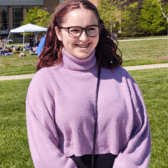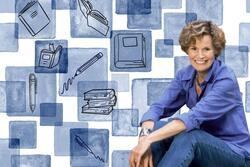Feminist Books Save Lives
I have severe social anxiety, so stories have been my best friends. They kept me company and gave me a whole world of experiences and asked nothing of me in return. When I was six or seven, I started making my father take me to the library every week. I was allowed to explore at will and borrow whatever piqued my interest, and when I stumbled upon a big yellow and pink book about feminism, I was hooked.
I have always been hyper-aware of the world around me and my role in it, specifically what it means to be female. At school, I saw adults treating me and my classmates differently because of our gender; I watched as girls were penalized for standing up for themselves. So when I learned that there was a global movement of people trying to make all genders equal, it was a revelation. I was obsessed with the idea that gender does not determine who you are, and it changed my life. I have always been opinionated and argumentative, but now I had something to fight for.
As the daughter of a historian, my first instinct was to look into the past of the movement, and the stories I found shaped who I am today. I learned about Alice Paul, Gloria Steinem, Lucretia Mott, and Emmeline Pankhurst. These women were frustrated, headstrong, and sick and tired of it all. Just like me. Among the angry women of yesteryear, I found my place. The feminist movement was the first place that accepted me wholly. It didn’t tell me to quiet down, be less passionate. It was the first place where I wasn’t too much.
And then I learned about the Jewish feminists. I first learned about the biblical heroes Hadassah and Miriam as real people and feminists at my synagogue's library, and I also learned the stories of modern women fighting for equality. There was a time in my life when I actually wanted to be Bella Abzug, a Jewish congresswoman at the forefront of second-wave feminism and the Women’s Liberation Movement and one of the biggest advocates for Title IX and the Equal Rights Amendment. Here were all these women just like me, who shared my Jewish traditions and culture and my feminist frustrations and concerns, using their iron will to change the world. These women felt so far away, but their presence felt evident in the Jewish women in my life. My mother, on the board of our synagogue. My aunts: a business owner, professor, and labor organizer. These women were leaders, advocates, and changemakers. And I could be just like them.
These are the women who taught me that I could be whoever I wanted to be, and that if I wanted to change the world — well, I could do that, too. When I decided I wanted to work in politics, Hillary Clinton taught me that people would vote for a woman president. Angela Merkel taught me that a woman could lead a continent. Madeleine Albright taught me that women could end wars. With the force of these women behind me, I could make my own path, and with the power of a whole movement pushing me forward, I could follow my dreams and change the world.
If I had not gone to the library that fateful day a decade ago, I would not be the feminist I am today. I would not be obsessed with history, and I would not be so connected to my Jewish identity. Public libraries built me into the person I am now, and I owe to them not just my passions and goals, but also my life. Stories saved me. They have been my home and refuge for more than a decade now, and I don’t know who I would be without them, but I know that I would not be writing this article right now. These books created the ever-evolving lens through which I now view the world.
My experience of finding myself in a library is much less common among people my age than it would have been even a decade ago. Across the country, efforts to ban books have been increasing in number and effectiveness, hitting school and public libraries especially hard. These are the places that made me who I am, so it's been an emotional experience, to say the least, to see books taken off the shelves.
It breaks my heart to see my favorite books banned, because every book I have ever loved is a piece of me, and I want others to have the chance to allow them to mean the same to someone else. I cried when I heard on a podcast from The New York Times that This Book is Gay by Juno Dawson was banned, and I sob most of the way through the banned book Poet X by Elizabeth Acevedo every time I read it. The last book I read from the Banned Book List was All the Bright Places by Jennifer Niven, about succumbing to mental illness and suicide, and it will stay with me forever.
But my favorite book on the Banned Books List is Not Your Perfect Mexican Daughter by Erika L. Sánchez. And maybe it means even more because my best friend’s mother, who is a school librarian, gave me the book. To me, this book represents a feeling of not belonging and struggling alone, of wanting to be a tiny piece of a world that doesn’t want you to be anything at all. This book showed me that things would get better, and no matter how bad it is in my head, there was something out there to hold on to, even if I didn’t know exactly what it was yet. This book saved my life.
I read every banned book I can. I think not only of the book, but of the people reading it. I wonder who would have read that book and realized they weren’t the only one. Who picked themself up again, decided not to end their life, changed the world. Books change and remake people, and each book on the Banned Books List has the chance to save a life. As a Jew and a woman, I feel a responsibility to fight book bans.
In a time when misinformation is increasingly harmful to Jews and silences our history and battles, a diverse perspective and education is vital. Historically, denial of education and refusal to acknowledge possibilities have been used to keep women down. Book bans are not just a matter of education and freedom of speech, but a matter of life and death, a matter of humanity.
This piece was written as part of JWA’s Rising Voices Fellowship.







